- Home
- Nick Carter
The Death’s Head Conspiracy Page 2
The Death’s Head Conspiracy Read online
Page 2
“Could the message come from a crank?”
“Were convinced it’s genuine. They have facts about the Mumura explosion that only those responsible could know.”
“They sure ask a big price. What if we turn them down?”
“According to the message, our largest cities will go up like Mumura. New York will be first, and after that, one of our cities will be destroyed every two weeks until we capitulate to their demands or there’s nothing left.”
I gave a tow whistle. “Where do I fit in?”
“The President wants an all-out effort on this, but we can’t afford a highly visible operation. Well have the full support of the Joint Intelligence Committee, but the job itself falls to AXE. And you’re the man, Nick.”
“When do you want me in Washington?”
“How soon can you make it?”
For the first time I saw that Yolanda was standing in the doorway watching me. She was still naked. One hand rested against the door jamb and her long legs were spread slightly. Her Spanish eyes smoldered with desire.
I said into the phone, “I can leave right away if you need me, but would tomorrow morning do?”
Hawk’s sigh came through clearly over the wire. “I suppose there’s nothing we could accomplish tonight, anyway. Go on and entertain your lady, but try to save some strength. I want you here and alert first thing in the morning. There’s a time factor here, and the morning briefing will be a crucial one.”
“I’ll be there,” I said and hung up.
Yolanda’s eyes roamed down my body, lingering when they came upon the center of her interest
“Thank goodness,” she said. “For a moment I thought I had lost your attention.”
“Not a chance,” I assured her. I moved forward quickly and picked her up in my arms. She was a big girl—broad through the shoulders and tall, with full, solid hips, and she was not used to being lifted into the air by a man. I carried her into the bedroom and eased her down onto the sheets.
“Oh, Nick,” she breathed, “please don’t leave me again like that.”
“Not tonight I won’t,” I promised her. Then I leaned forward and picked up the action where we had left off.
Two
When I stepped off the 747 at Dulles International Airport I was met by a silent young man who whisked me to a waiting limousine. He maneuvered neatly through the morning traffic to pull up finally in front of an unremarkable building on Du Pont Circle.
I recognized the man who came out the door as I entered. He was the President’s top national security adviser. He was not smiling. The people in the lobby —a magazine vendor, browsing customers, a guard at the elevator—seemed average enough unless you looked closely at their eyes. Then you saw the hard, no-nonsense scrutiny that shows in the eyes of trained government agents on duty. Full security was in effect at AXE headquarters.
I presented my credentials three different times, had my face scanned by telecomputer and my palm print verified by an electronic sensor. Finally the electronic and human watchdogs were convinced that I really was Nick Carter, AXE Agent N3, rating Killmaster, and I was allowed in to see David Hawk.
He sat in his frayed leather chair, chewing on one of the long cigars he almost never lit His steel-blue eyes betrayed no emotion as he nodded me into a chair across from him.
“I can’t understand,” he said, “how you continue to look so abominably healthy, considering the life of debauchery you lead between assignments.”
I grinned at the old man, who sat ramrod straight, looking more like a man in his fifties than his seventies. “The secret is always to think pure thoughts,” I told him.
“Sure it is,” he said. One side of his mouth quirked slightly, which was the closest thing to a smile that ever appeared on his leathery New England face. Then he went dead serious. “Nick, we’ve got deep trouble.”
“So it seems. You said we received a message yesterday.”
“That’s right. The man claims he and his people are responsible for the Mumura explosion and they are prepared to destroy our cities one by one.”
“Who is the man?” I asked.
“Anton Zhizov. I believe you know the name.”
“Of course. Number-two man in the Russian Miliary High Command. I thought you said none of the big powers were involved.”
“The Soviets deny any responsibility for Zhizov. As you know, he’s been the leader of the militant hardliners in the Kremlin. He’s been increasingly unhappy with the growing detente between our countries. Apparently he’s pulled out on his own. He took Colonel Gorodin of the Red Army and some navy personnel who didn’t believe in peaceful coexistence. They also seem to have gotten away with a large supply of Russian gold.”
“And Zhizov thinks that with a few nuclear weapons they can conquer the U.S.?”
“What he’s counting on, our experts believe, is that once he’s muscled us into negotiations or blown up several of our cities, the Soviet government will switch its policy and back him up.”
“Do you think the Russians would do that?”
“I don’t even want to speculate on it,” Hawk said. “Our only concern now is that Zhizov must be stopped. The President has indicated there will be no discussion of surrender. If Zhizov is telling the truth —and we’ve got to assume that he is—his bombs are already planted in a number of American cities.”
“You said New York is the first target. Did Zhizov give us a time deadline?”
“Ten days.” Hawk’s eyes flicked at the open page of his desk calendar. “We have nine days left.”
“Then the sooner I get started the better. Do we have any leads?”
“Just one. An agent in Los Angeles working with the Atomic Energy Commission saw the secret data on the Mumura explosion and the message from Zhizov and contacted us Just a few hours ago. The agent says she has information that may be valuable and asks that we send a man out so she can deliver it in person.”
“Excuse me,” I interrupted, “did you say she?”
Hawk bit down hard on his cigar and frowned at me, but I detected a twinkle in his eyes. “I don’t know how you fall into these things, Nick, but yes, the agent is a woman. A very attractive one, if we are to believe the picture in her dossier.”
He slid an eight by ten black and white photo across the desk.
The face that looked up at me had high cheekbones, large pale eyes set wide apart, and a mouth that showed a hint of humor, all framed by rich blonde hair that flowed loosely to her shoulders. I flipped the photograph over to check the vital statistics. Rona Volstedt, Age 26, Height 5’7’’, Weight 115 pounds.
I gave the picture back to Hawk.
He said, “If I had luck like yours I’d make my fortune at the racetrack and retire in two weeks.”
I grinned. “As I told you, I owe it all to thinking pure thoughts. Do you want me to get started right away?”
“You’re booked on a one P.M. flight for the Coast. Before you leave, drop in at Special Effects. Stewart has some new toys to show you.”
As usual, Stewart was fussy and meticulous about showing me his latest developments, but since his “toys” had saved my life more than once, I let him present them in his own way.”
“You will observe the small fire burning behind the glass partition,” Stewart said by way of greeting.
“You’ve done it this time, Stewart,” I said. “You’ve invented fire!”
He ignored my remark and went on. “These round white pills in my hand are a refinement on our familiar smoke pellets. I will demonstrate.” He shoved one arm through the mouth-like rubber seal in the partition and tossed one of the pellets into the fire, quickly withdrawing his hand.
There was a soft, popping sound, and a blue haze filled the small sealed room.
“That’s it?” I asked, a little disappointed.
“As you can see,” Stewart said as if I hadn’t spoken, “the smoke appears to be very thin, barely coloring the air and apparently no hindra
nce to vision or actions. However, I’d like you to take a very small sniff.”
Averting his face, Stewart pried apart the rubber lips of the seal with his thumbs. Any smoke that escaped was too thin to be visible, but I went ahead and took the smallest possible inhalation. Instantly I was coughing and sneezing. Tears blinded my eyes, and the lining of my nose and windpipe seemed to be on fire. Some fifteen seconds after Stewart had closed the seal the symptoms cleared up and I was able to breathe and see again.
“Powerful stuff,” I said, noting that Stwart seemed Just a little bit smug about my discomfort
“The effects, as you perceive, are quite temporary,” he said, “but the smoke from one pellet can immobilize everyone in an average-size room within three seconds. Now I’d like you to try this.” He handed me what appeared to be an ordinary linen handkerchief.
“You want me to blow my nose?” I asked.
“A superfine mesh is woven into the cloth,” he said. The corners will attach behind your head to provide a mask against the effects of the smoke.”
I pulled the handkerchief across my nose and mouth and pressed two corners together at the back of my head. They stuck to each other and kept the mask in place. I opened the rubber seal on the glass partition and took a small experimental whiff, then breathed in deeply. The acrid smell was still there, but this time I had none of the unpleasant effects. I closed the seal and took off the handkerchief-mask.
“Good work, Stewart,” I said, and meant it.
He tried not to look too pleased. “I have one more little item here that you might find useful.” From a drawer he took a brown leather belt and held it out in front of me like a proud father displaying his new baby.
Taking the belt from his hands, I said, “Stewart, you must be slipping. That is one of the most obvious phony buckles I’ve seen in years. It wouldn’t fool a professional agent for ten seconds. What’s inside, a Captain Midnight decoder?”
“Why don’t you open it and find out?”
Something in Stewart’s tone told me he was ahead of me, but just the same, I examined the trick buckle, quickly finding the tiny spring latch that opened the hidden compartment. I popped it open and there was a sharp report as a paper cap went off in the buckle.
Stewart said, “In the real model there is a small explosive charge inside instead of a cap. Not powerful enough for much destruction, but quite capable of killing or crippling the sharp-eyed enemy agent who has taken it away from you.”
I took half a dozen of the smoke pellets and the handkerchief-mask and traded my own belt for Stewart’s trick model. I took the tools of my trade out of the small bag I’d brought with me—Wilhelmina, my 9mm. Luger, and Hugo, my double-edged, razor-sharp stiletto. I put the Luger into an FBI-type belt holster and the stiletto into a specially constructed chamois-skin sheath that I strapped to my right forearm. With just the right flex of my forearm muscle, Hugo would drop hilt-first into my hand. I slipped my jacket back on, picked up my bag, and headed for the street to grab a taxi for Dulles. Killmaster was back in business.
Three
It was one of those rare days In Los Angeles when the wind swept the basin clear of smog. The city was spread out below the jet like a living organism of concrete and asphalt with the great freeway arteries laid open as though by a great dissecting knife.
The taxi ride from L.A. International to Rona Volstedt’s address at the foot of one of the canyons in the Santa Monica Mountains was a long one. I relaxed with a cigarette while the driver told me in detail how he would do things if he were managing the Dodgers.
He dropped me off in front of a comfortable-looking cottage, tucked back off the road among the pines. The canyon stillness was broken by the noise of about a dozen motorcycles a short distance down the road. It seemed like an odd place for a bike club to be gathering, but there’s no accounting for the preferences of motorcycle types.
I climbed the short flight of stone steps and padded across a carpet of pine needles to the front door. There was no bell, so I knocked.
The girl who opened the door was, if anything, an improvement over the photograph I’d seen in Hawk’s office. Her skin was clear and white, with a touch of color at the cheekbones. Her eyes, I could now see, were the deep blue of Nordic seas and the soft blonde hair seemed touched with moonlight.
“I’m Nick Carter,” I said, “from AXE.”
Her eyes gazed for a minute at my face, then took in my shoulders and ran over the rest of my body. “Come in,” she said. “I’m Rona Volstedt.”
Her livingroom looked like an explosion in a music store. Bits and pieces of guitars were scattered about without apparent method, bottles of glue and shellac sat on the carpet, and a few intact instruments leaned against the walls.
Bona saw me take it all in. She said, “My hobby is building and repairing guitars. I find it very relaxing.”
“You must spend a lot of time alone working on them,” I said.
“I hadn’t realized how much till just now.”
“Maybe we can make some adjustments in the way you spend your leisure time,” I said. “But first, you were going to give us some information about the Mumura explosion.”
“I’m not sure I know what you mean,” she said doubtfully.
It was the right response. I had deliberately not given her the recognition sign. I knew Hawk would have briefed her, and I wanted to be sure I was talking to the right woman.
“Can you spare a match?” I said.
“Sorry, I don’t keep them since I quit smoking.”
“I tried to quit last year myself, but I only lasted two weeks.” I always felt just a little silly going through one of these routines, but it’s little safeguards like this that can make the difference between a live espionage agent and a dead spy.
Rona Volstedt relaxed and sat down on the small couch. She wore a pair of blue pants that kept her legs a secret, but her loose fitting blouse gaped enough to reveal firm, uptilted breasts that didn’t need any support from the lingerie industry. She was a lean girl but by no means emaciated. I sat down next to her, inhaling a light floral scent, and she began to talk.
“As you were probably told, I’m with the AEC. Most of our undercover work and investigations are handled by the FBI, but we do a few of the jobs ourselves. It was on one of those that I met Knox Warnow.
“Five years ago he had a very minor post at one of our power projects. He began to talk at cocktail parties and apparently expressed some strange political opinions. I was assigned to get as close as I could to him to sound him out. It wasn’t difficult. He was starved for someone to listen to his ideas. He had in his mind a process for making a nuclear explosive in plastic that could be molded into almost any shape. I asked him what the object of that would be, and his eyes really lit up. This stuff, he said, could be shaped into innocent looking objects, smuggled easily into any country in the world and planted in their cities. A demand could be made that the country surrender or the cities would be destroyed one by one.”
“Sure sounds like our Mumura people.”
“That’s what I thought He needed money to perfect his process, a lot of it He took his scheme to AEC officials and they practically threw him out of the office. Our emphasis is mostly on peaceful uses of atomic energy, and nobody even wants to talk about weapons.
“Naturally, Warnow was eased out of his Job with the commission. He was pretty bitter about it. Swore he’d get even with the whole rotten country for not supporting him. Soon after that he dropped out of sight, and we didn’t try too hard to locate him, since, frankly, we considered him a crackpot.”
“You did a good job on Warnow,” I said, Then to tease her a little, I added, “How close did you manage to get to him?”
She lowered her lids and peered at me with her deep blue gaze. “As a matter of fact, I never got that close. Warnow was so completely involved in his plastic process that he couldn’t get interested in . . . other things. I was a little relieved. He had an electro
nic pacemaker to regulate his heartbeat, and it would have been pretty embarassing to have it short circuit at an intimate moment. Tell me, Nick, you don’t use any artificial aids like that, do you?”
“Nope,” I grinned. “I’m still using all the original parts.”
“I’m glad to hear it. Would you like a cocktail?”
“That’s an excellent idea,” I said. “Then I’ll call Hawk in Washington and pass on what you’ve told me. If we’re lucky, we might have the evening to ourselves.”
We walked together to the bright, compact kitchen at the rear of the cottage. I said, “This is quite an isolated place you have here.”
“Yes, I know. I like it this way. Crowds have never appealed to me much. That road outside dead-ends a couple of miles up the hill at a private estate, so there’s not much traffic past here.”
“If it weren’t for those motorcycles growling outside, you might be miles out in the country. Do they come around here much?” “No, this is the first time I’ve ever seen them. They seem to be waiting for something to happen. It’s a little creepy, but they haven’t approached the house.”
Alarm bells went off in my head loud and clear.
“Rona, that call you made to Hawk this morning —did you use the phone here?”
“Yes, I did. Why—?” She gasped as understanding came. “Do you think my line is bugged?”
“It’s safest to assume all lines are bugged until you prove otherwise. I don’t like that cycle gang out front Do you have a car?”
“Yes, it’s parked on the street pointing up the hill.”
“Throw a couple of things together and let’s get out of here.”
“But where will we go?”
“AXE keeps a beach house out at Malibu for agents to use when necessary. You’ll be much safer there.” I didn’t add, “If we get past the motorcycle crowd,” but that’s what I was thinking.
Four
We went out the back door and slipped through the shrubbery to the steep road where Rona’s car was parked.

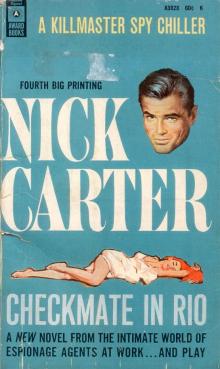 Checkmate in Rio
Checkmate in Rio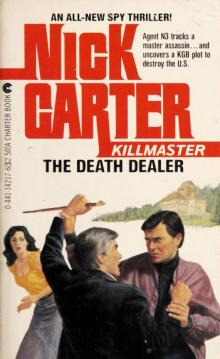 The Death Dealer
The Death Dealer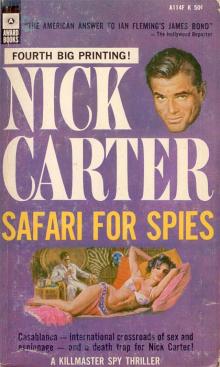 Safari for Spies
Safari for Spies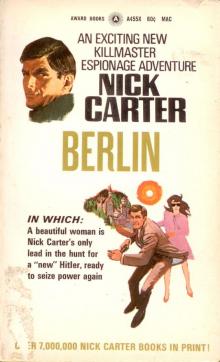 Berlin
Berlin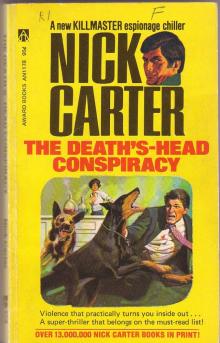 The Death’s Head Conspiracy
The Death’s Head Conspiracy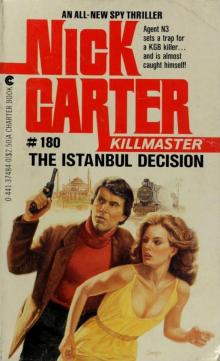 The Istanbul Decision
The Istanbul Decision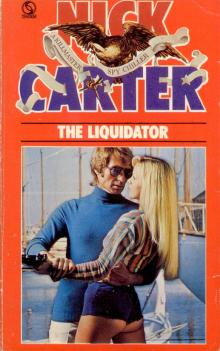 The Liquidator
The Liquidator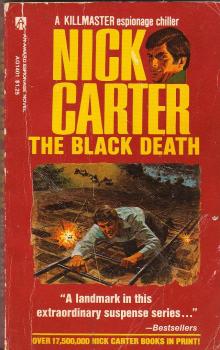 The Black Death
The Black Death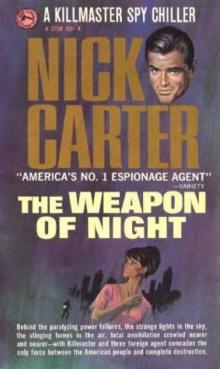 The Weapon of Night
The Weapon of Night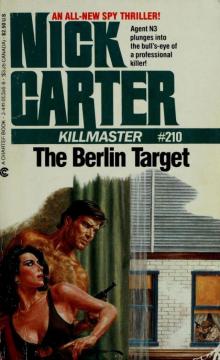 The Berlin Target
The Berlin Target Temple of Fear
Temple of Fear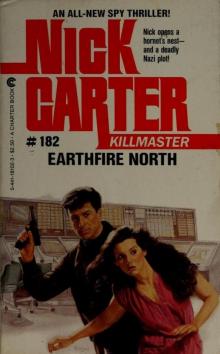 Earthfire North
Earthfire North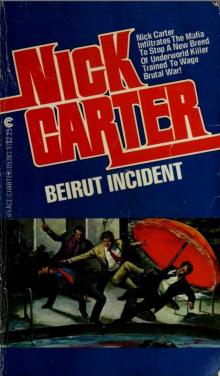 Beirut Incident
Beirut Incident White Death
White Death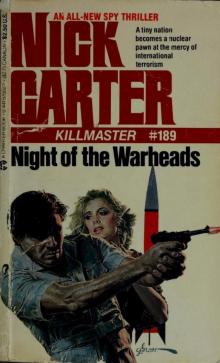 Night of the Warheads
Night of the Warheads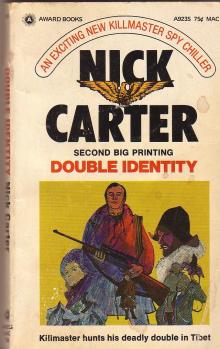 Double Identity
Double Identity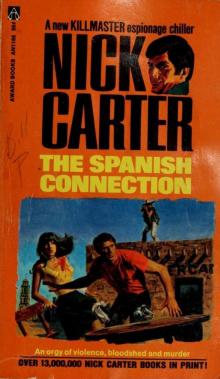 The Spanish Connection
The Spanish Connection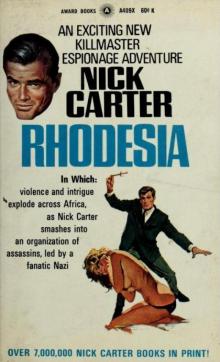 Rhodesia
Rhodesia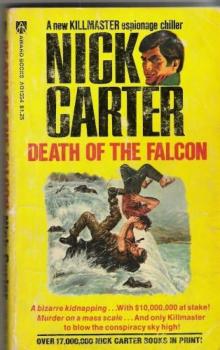 Death of the Falcon
Death of the Falcon The Executioners
The Executioners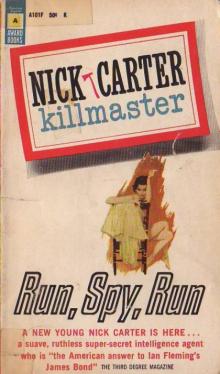 Run, Spy, Run
Run, Spy, Run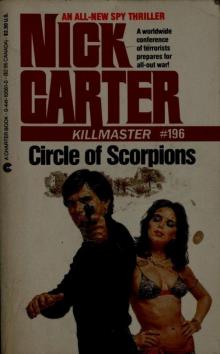 Circle of Scorpions
Circle of Scorpions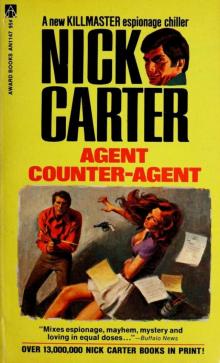 Agent Counter-Agent
Agent Counter-Agent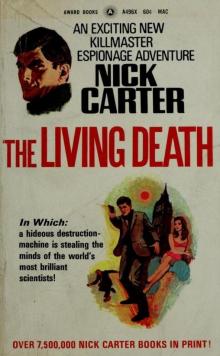 The Living Death
The Living Death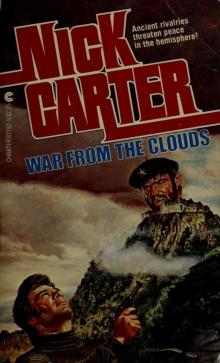 War From The Clouds
War From The Clouds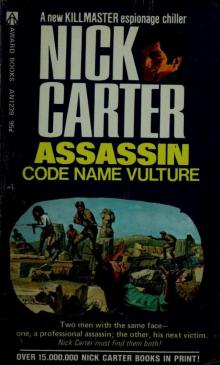 Assassin: Code Name Vulture
Assassin: Code Name Vulture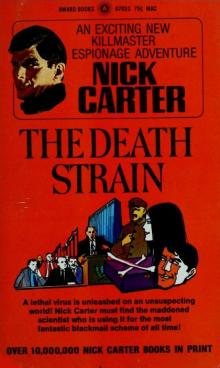 The Death Strain
The Death Strain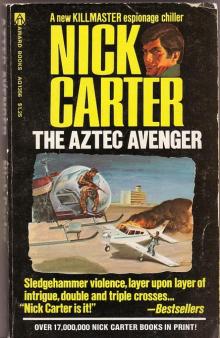 The Aztec Avenger
The Aztec Avenger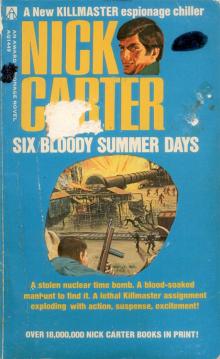 Six Bloody Summer Days
Six Bloody Summer Days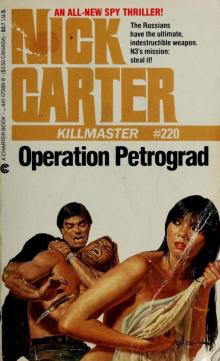 Operation Petrograd
Operation Petrograd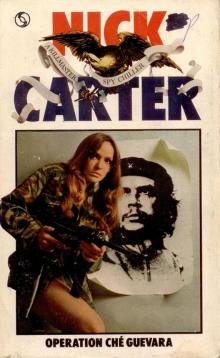 Operation Che Guevara
Operation Che Guevara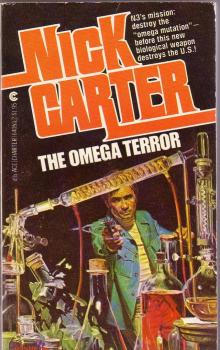 The Omega Terror
The Omega Terror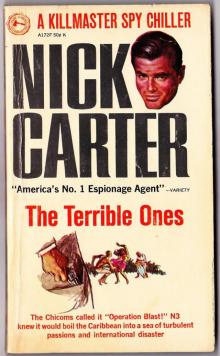 The Terrible Ones
The Terrible Ones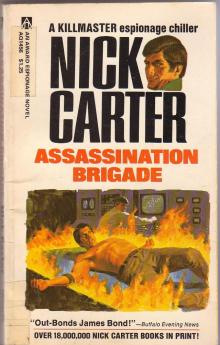 Assassination Brigade
Assassination Brigade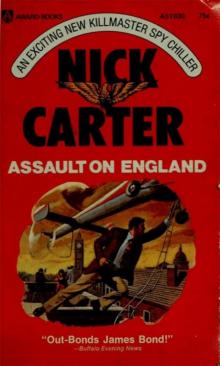 Assault on England
Assault on England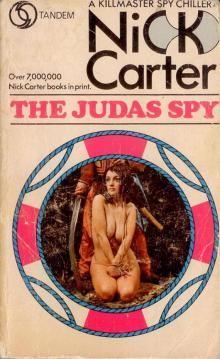 The Judas Spy
The Judas Spy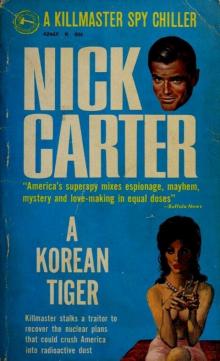 A Korean Tiger
A Korean Tiger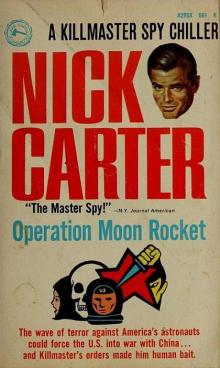 Operation Moon Rocket
Operation Moon Rocket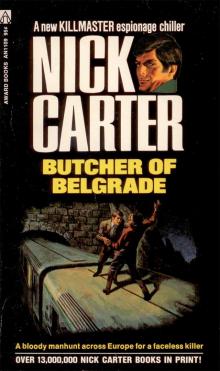 Butcher of Belgrade
Butcher of Belgrade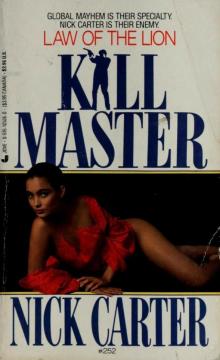 Law of the Lion
Law of the Lion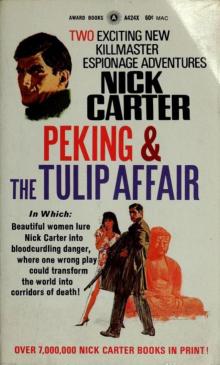 Peking & The Tulip Affair
Peking & The Tulip Affair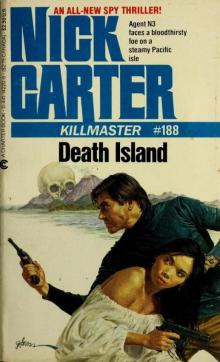 Death Island
Death Island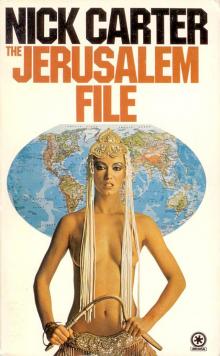 The Jerusalem File
The Jerusalem File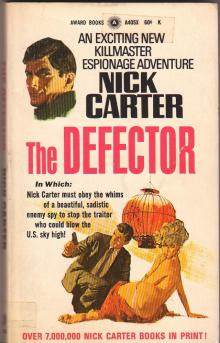 The Defector
The Defector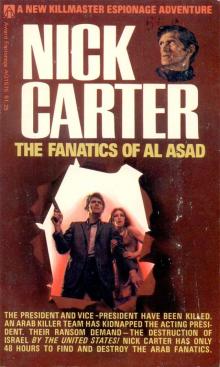 The Fanatics of Al Asad
The Fanatics of Al Asad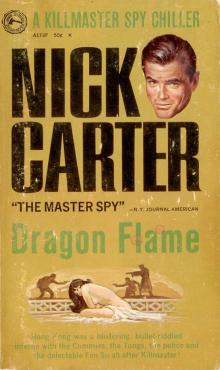 Dragon Flame
Dragon Flame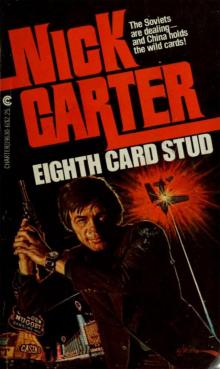 Eighth Card Stud
Eighth Card Stud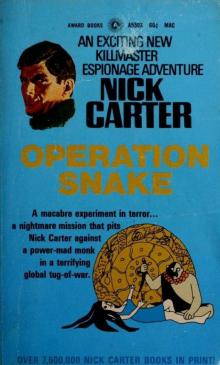 Operation Snake
Operation Snake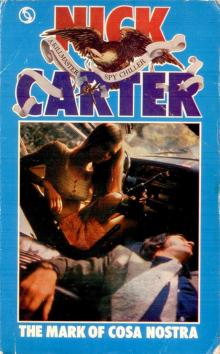 The Mark of Cosa Nostra
The Mark of Cosa Nostra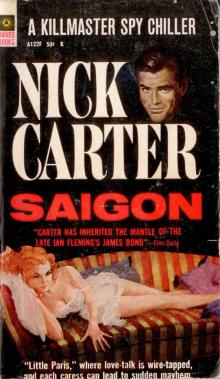 Saigon
Saigon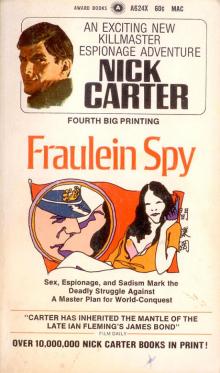 Fraulein Spy
Fraulein Spy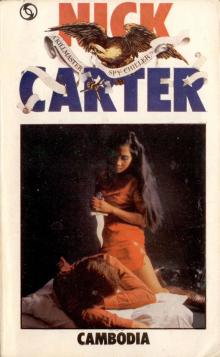 Cambodia
Cambodia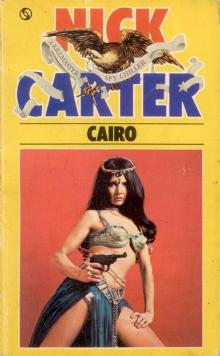 Cairo
Cairo